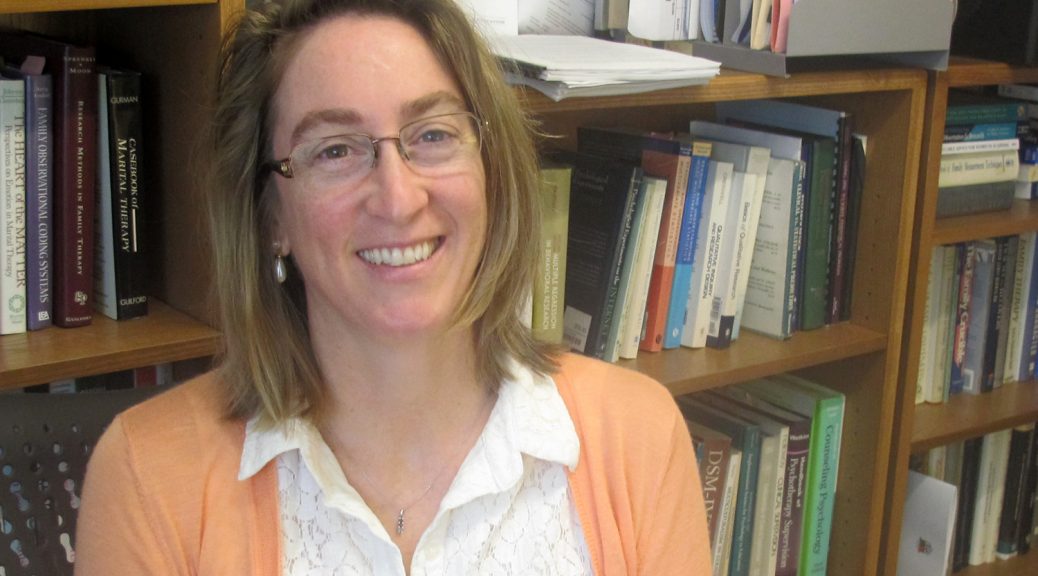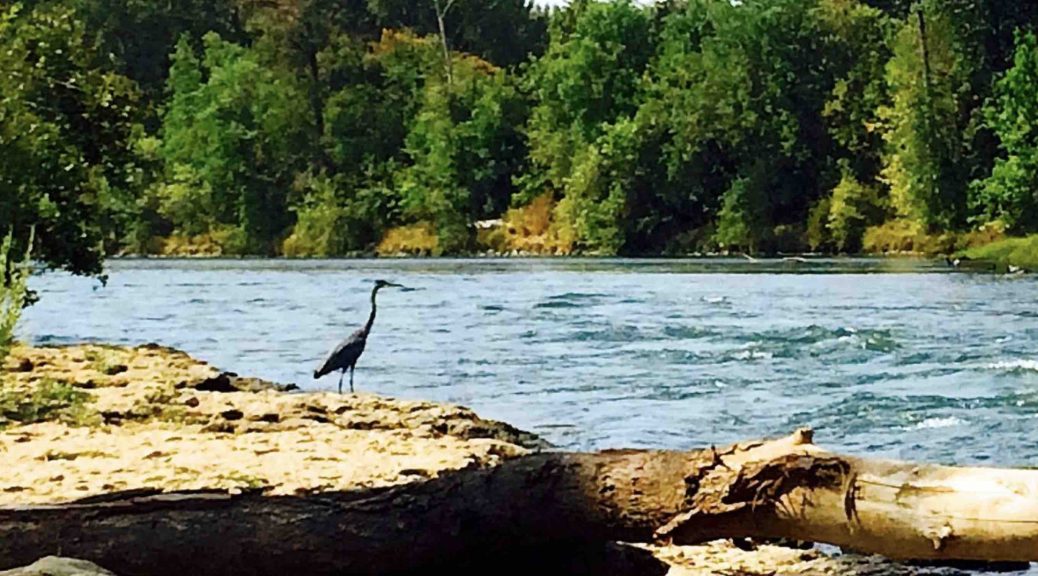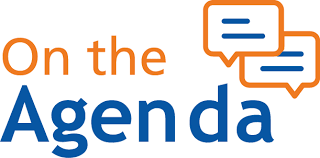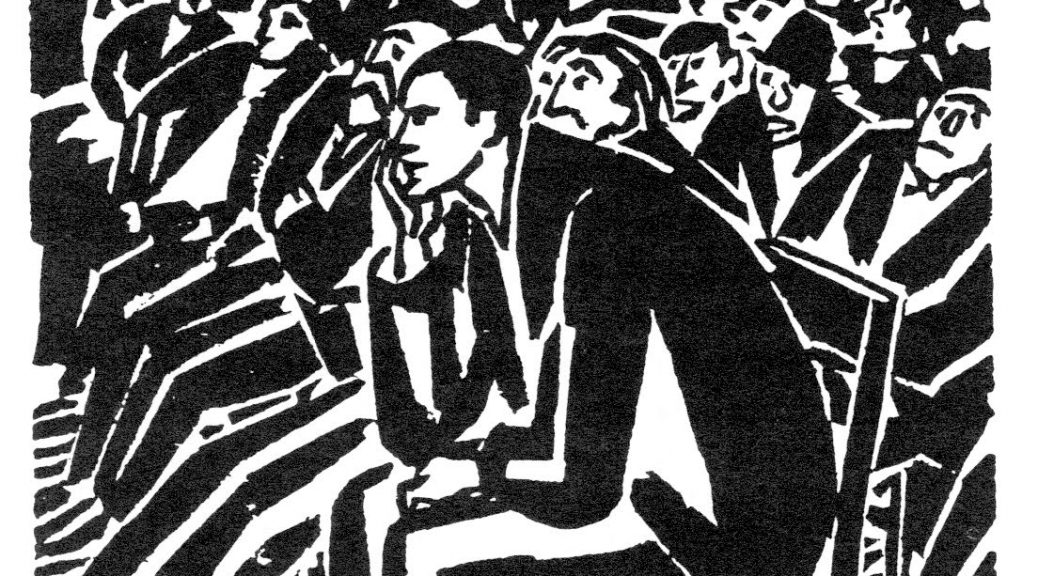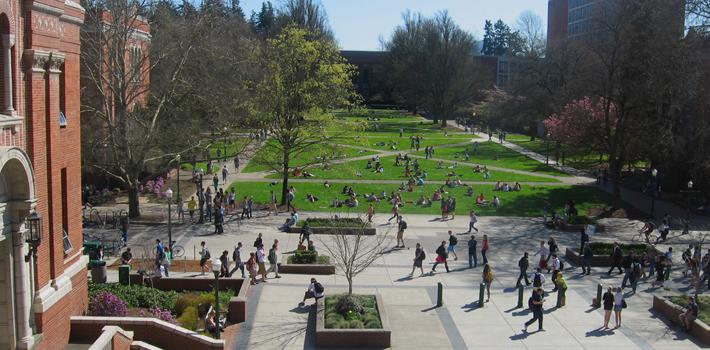University Senate
*Statutory Faculty openings for 2017-2018 election cycle must come from tenured, tenure-track, officers of instruction and officers of administration with tenure in an academic department classifications.
College of Arts and Sciences – No more than two from any department
Natural Sciences – 5 faculty openings
1. Margaret Sereno, Psychology
2. Alan Rempel, Earth Sciences
3. Chris Sinclair, Mathematics
4. Michelle Wood, Biology
5. Lou Moses
Social Sciences – 2 faculty openings
1. Glen Waddell, Economics
2. Eileen Otis, Sociology
3.
Humanities – 5 faculty openings
1. Zhuo Jing-Schmidt, East Asian Languages
2. Volya Kapatinski, Linguistics
3. Caroline Lundquist, Geography
4. Pedro Garcia-Caro, Romance Languages
5. Michael Stern, German & Scandinavian Studies
6. Alejandro Vallega, Philosophy
7. Mark Whalan, English
Professional Schools
College of Design – 2 faculty openings
1.
2.
Lundquist College of Business – 2 faculty openings
1. Ali Emami, Finance
2. Robin Clement, Business
College of Education – 1 faculty openings
1. Elizabeth Skowron, Counseling Psychology
School of Journalism & Communication – 1 faculty openings
1. Christopher Chavez, Advertising
School of Law – No current openings
School of Music & Dance – No current openings
Clark Honors College – 1 opening
1. Vera Keller
UO Libraries -1 faculty openings
1.
Officers of Administration – 1 opening
1. Monica Bray, College of Business
2. Sharece Bunn, International Affairs
3. Jesse Conway, Research & Innovation
4. Angela Long, Health Center
5.Jessica Marquez, SOJC
6. Jill Martineau, Dean of Students
7. Thor Mikesell, SOMD
8. Brady Nittmann, Budget & Resource Planning
9. Melina Pastos, Undergraduate Studies
10. Cressa Perloff, Education Science Lab
11. Jessica Roberts, College of Education
12. David Salmon, Undergraduate Studies
ASUO Student Senators – 5 openings (selected by the ASUO)
Classified Staff – 2 openings
1. Jay Butler, Business Affairs
2. Don Dixon, CASIT
3. Zach Fairchild, Student Life
4. Angie Hopkins, CSWS
5. Bill Madden, CASIT
6. Valerie Mickelson, Printing & Mailing
7. Sarah Proctor, Libraries
8. Peggy Schneider, Parking & Transportation
9. Dan Shepard, Human Physiology
10. Marie Swarringim, Campus Planning
11. Louie Vidmar, SOJC
12. Lisa Wimberly, EC Cares
Elected Committees
Committee on Sexual and Gender-Based Violence – 3 openings
1. Hayden Harker, Mathematics
2. Heather McBride, English
3. Mikhail Myagkov, Political Science
4. Nancy Nelson, Education
5. Mary Oberlies, UO Libraries
6. Ofer Raban, Law
Core Education Council (NEW)
College of Arts & Sciences
Natural Sciences – 1 opening
1. Edward Davis, Earth Sciences
2. Chris Sinclair, Mathematics
Social Sciences – 1 opening
1. Pedro Garcia-Caro, Romance Languages
2. Emily Simnitt, English
Professional Schools – 3 openings
1. Alison Schmitke, Education
2. TBD
3. TBD
Faculty Advisory Council
Career NTTF – 1 opening
Randy Sullivan, Chemistry
Humanities – 1 opening
1. Martha Bayless, English
2. Spike Gildea, Linguistics
3. Zhuo Jing-Schmidt, East Asian Languages
4. Volya Kapatinski, Linguistics
5. Tyler Kendall, Linguistics
6. Pedro Garcia-Caro, Romance Languages
7. Michael Stern, German & Scan Studies
Professional Schools (NTTF) – 1 opening
1. TBD
Officers of Administration – 1 opening
1. Jill Martineau, Office of Dean of Students
2. Thor Mikesell, Music
3. Jen Mirabile, Human Resources
4. Jessica Roberts, College of Education
5. Teri Rowe, Economics & Sociology
6. David Salmon, Undergraduate Studies
7. Sara Stubbs, Information Services
Professional Schools (TTF) – 1 opening
1. John Chalmers, Business
2. Alex Dossin, Music
3. Ihab Elzeyadi, Architecture
4. Fritz Gearhart, Music
5. Charles Martinez, Education
6. Kevin Nute, Architecture
7. Jason Silveira, Music
Faculty Grievance Appeals Committee – 2 openings
1. Burke Hendrix, Political Science
2. Dave Fowler, UO Libraries
3. Mary Grenci, UO Libraries
4. Peng Lu, Mathematics
5. Kevin Nute, Architecture
6. Ofer Raban, Law
Faculty Personnel Committee
College of Arts & Sciences – 4 openings
1. Marcin Bownik, Mathematics
2. Sangita Gopal, Cinema Studies
3. Volya Kapatsinski, Linguistics
4. Peng Lu, Mathematics
5. Carol Silverman, Anthropology
6. Caleb Southworth, Sociology
7. Michael Stern, German & Scan Studies
8. Stephen Frost, Anthropology
School of Law – 1 opening
1. TBD
School of Journalism & Communication – 1 opening
1. Donnalyn Pompper, SOJC
Graduate Council
College of Business – 1 opening
1. Hong Yuan
CAS Humanities – 1 opening
1. Anne Laskaya, English
2. Fabienne Moore, Romance Languages
CAS Social Sciences – 2 openings
1. Burke Hendrix, Political Science
2. Jeremy Piger, Economics
School of Music & Dance – 1 opening
1. Leslie Straka, Music
Intercollegiate Athletics Advisory Committee
Classified Staff – 1 opening
1. Don Dixon, CASIT
2. Zach Fairchild, Student Life
3. Lauren Goss, Libraries
4. Christina Green, Business Affairs
5. Angie Hopkins, CSWS
6. Marty Hurst, Educational and Community Supports
7. Bill Madden, CASIT
8. Valerie Mickelson, Printing & Mailing
9. Sarah Proctor, Libraries
10. Peggy Schneider, Parking & Transportation
11. Lisa Wimberly, EC Cares
Faculty – 1 opening
1. Curtis Austin, History
2. Charlie Butler, Journalism
3. Katherine Donaldson, Libraries
4. Dave Fowler, Libraries
5. Spike Gildea, Linguistics
6. Joshua Gordon, Business
7. Rebekah Hanley, Law
8. Hayden Harker, Mathematics
9. Burke Hendrix, Political Science
10. Kathleen Lenn, Libraries
11. Peng Lu, Mathematics
12. N. Christopher Phillips, Mathematics
13. Glen Waddell, Economics
Officers of Administration Council – 4 openings
1. Jesse Conway, Research & Innovation
2. Larissa Ennis, University Advancement
3. Angela Long, Health Center
4. Jessica Marquez, SOJC
5. Jill Martineau, Office of Dean of Students
6. Thor Mikesell, Music
7. Brett Moody, Office of Dean of Students
8. Brady Nittmann, Budget & Resource Planning
9. Cressa Perloff, Education Science Lab
10. Jessica Roberts, College of Education
11. David Salmon, Undergraduate Studies
12. Micah Sardell, Information Services
13. Sara Stubbs, Information Services
Promotion-Tenure-Retention Appeals Committee – 1 opening
1. Martha Bayless, English
2. Peng Lu, Mathematics
3. Carol Silverman, Anthropology
Undergraduate Council
CAS At Large – 2 openings
1. Jagdeep Bala, Psychology
2. Kathleen Freeman Hennessy, Computer and Information Science
3. Tyler Kendall, Linguistics
4. Hardiner Khalsa, Romance Languages
5. Craig Parsons, Political Science
6. Jana Prikryl, Biology
7. Caleb Southworth, Sociology
8. Michael Stern, German & Scan Studies
9. Randy Sullivan, Chemistry
10. Thomas Tasker, AEI
11. Arkady Vaintrob, Mathematics
CAS Humanities – 2 openings
1. Tyler Kendall, Linguistics
2. Harinder Khalsa, Romance Languages
3. Michael Stern, German & Scan Studies
CAS Natural Sciences – 1 opening
1. Jagdeep Bala, Psychology
2. Jana Prikryl, Biology
3. Randy Sullivan, Chemistry
4. Arkady Vaintrob, Mathematics
5. Craig Parsons, Political Science
6. Caleb Southworth, Sociology
College of Design – 1 opening
1. TBD
College of Education – 1 opening
1. Jessica Cronce, Family & Human Services
College of Business – 1 opening
1. Erin Cil, Business Analytics
2. Michele Henney, Business
School of Music & Dance – 1 opening
1. Drew Nobile, Music Theory
2. Jason Silveira, Music
Appointed Committees
Campus Planning Committee
College of Design – 1 opening
1. TBD
Faculty – 2 openings
1. Lowell Bowditch, Classics
2. Dean Livelybrooks, Physics
3. Krista McGuire, Biology
4. Edward Teague, UO Libraries
5. Rebekah Hanley, Law
6. Katherine Donaldson, UO Libraries
7. Marcin Bownik, Mathematics


